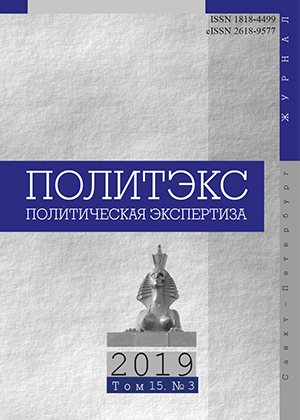PUBLIC DIPLOMACY AS A FORM OF PUBLIC POLICY: THE STATE IN THE SITUATION OF POST-TRUTH AND THE CRISIS OF DEMOCRACY
DOI:
https://doi.org/10.21638/spbu23.2019.306Abstract
The article is devoted to the study of public diplomacy and its role in modern politics. Public diplomacy is analyzed as a form of public policy, which becomes relevant when the boundaries between the macropolitical (national) and the megapolitical (transnational) discourses are demolished. The emerging political meaning for public diplomacy is based among others upon the crisis of the democratic model, and one of the implications of the latter is the phenomenon of post-truth, accompanied with diverse and multidirectional information streams, resulting in different worldview frames of references with varying agendas. Public diplomacy as, on the one hand, a set of tools for public involvement, and on the other hand, a mechanism for the international dialogue comes to be a productive form not only for political relations with different countries, but also for reproducing state activity as an institution to deal with both civil society inside and other states and non-state actors outside the country. The explosive growth of communication tools, which under the present-day conditions are easily turned into transnational forms, encourage the steady development of public diplomacy as a specific field for global dialogue, one of the most important direction for strategic communications, in a sense, an independent sphere of public interaction. While undermining the monopoly of the state on the external relations and reducing its institutional stability, public diplomacy at the same time discovers some new lacunas for applying public policy, for new approaches to cohering interests of government and people, to generating public policy in general. Antiestablishment sentiment as well as reposting the populist agenda, which is a good example of the timely global political trend, at the same time, allow societies all over the world to reflect on the respective national practices, which might be also considered as an additional effect of the public diplomacy discourse
Keywords:
PUBLIC DIPLOMACY, PUBLIC POLICY, STATE, DEMOCRACY, POST-TRUTH, CIVIL SOCIETY, POPULISM, GLOBALIZATION, NON-STATE ACTORS
Downloads
References
Алексеева Т.А. Современная политическая мысль (XX–XXI вв.): политическая теория и международные отношения. М.: Аспект Пресс, 2015. 632 с. Бурлинова Н. В. Курс общественного дипломата. М.: НП Российский совет по международным делам, 2017. 76 с.
Лебедева М. М. Публичная дипломатия в урегулировании конфликтов // Международные процессы. 2015. Т.13, No 4 (43). С.45–56. https://doi.org/10.17994/it.2015.13.4.43.3.
Лукин А.В. Публичная дипломатия: государственная пропаганда или общественная инициатива? // Дипломатический ежегодник — 2012. М.: Весь мир, 2013. С. 57–86. Сморгунов Л.В. (ред.) Управление публичной политикой: коллективная монография. М.: Аспект Пресс, 2015. 320 с.
Соловьев А. И. Политология: Политическая теория, политические технологии. М.: Аспект-Пресс, 2009. 575 с.
Чугров С.В. Post-truth: трансформация политической реальности или саморазрушение либеральной демократии? // Полис. Политические исследования. 2017. No 2. С. 42–59. https:// doi.org/10.17976/jpps/2017.02.04.
Art of the lie // The Economist. September 9, 2016. URL: http://www.economist.com/news/ leaders/21706525-politicians-have-always-lied-does-it-matter-if-they-leave-truth-behind-entirely- art?fsrc=scn/tw/te/pe/ed/artofthelie (дата обращения: 10.02.2019).
Corner J. Fake news, post-truth and media — political change // Media, Culture & Society. 2017. No. 39 (7). P.1100–1107. https://doi.org/10.1177/0163443717726743.
Habermas J. Der gespaltene Westen: Kleine Politische Schriften X. Frankfurt am Main: Suhrkamp 2383, 2004. 192 S.
Hannan J. Trolling ourselves to death? Social media and post-truth politics // European Journal of Communication. 2018. No. 33 (2). P. 214–226. https://doi.org/10.1177/0267323118760323.
Merkel W., Kneip S. Democracy and Crisis. Challenges in Turbulent Times. Basel: Springer International Publishing, 2018. 373 p.
Naim M. What Is a Gongo? // Global Politics in a Changing World. Boston; New York: Houghton Mifflin Harcourt Publishing Company, 2009. P.222–224.
Spengler O. Der Untergang des Abendlandes — Umrisse einer Morphologie der Weltgeschichte. Wiesbaden: Marix Verlag, 2007. 1024 S.
Word of the Year 2016 is... // Oxford Dictionaries. URL: https://en.oxforddictionaries.com/word- of-the-year/word-of-the-year-2016 (дата обращения: 10.02.2019).
Wharton B. Remarks at Workshop on “Public Diplomacy in a Post-Truth Society”. Hoover In- stitution, Stanford University. Stanford, California. March 20, 2017. URL: https://www.state.gov/r/ remarks/2017/268592.htm (дата обращения: 10.02.2019).
References
Alekseeva T. A. Modern Political Thought (20th–21st centuries): Political Theory and International Relations. Moscow, Aspekt Press Publ., 2015. 632 p. (In Russian)
Art of the lie. The Economist. 2016. 9 September. Available at: http://www.economist.com/ news/leaders/21706525-politicians-have-always-lied-does-it-matter-if-they-leave-truth-behind- entirely-art?fsrc=scn/tw/te/pe/ed/artofthelie (accessed: 10.02.2019).
Burlinova N. V. Public Diplomat Course. Moscow, NP Rossiiskii Sovet po Mezhdunarodnym De- lam Publ., 2017. 76 p. (In Russian)
Chugrov S.V. Post-truth: Transformation of Political Reality or Self-Destruction of Liberal De- mocracy? Polis. Politicheskie issledovaniia, 2017, no. 2, pp. 42–59. https://doi.org/10.17976/ jpps/2017.02.04. (In Russian)
Corner J. Fake news, post-truth and media–political change. Media, Culture & Society, 2017, no. 39 (7), pp. 1100–1107. https://doi.org/10.1177/0163443717726743.
Habermas J. Der gespaltene Westen: Kleine Politische Schriften X. Frankfurt am Main, Suhrkamp 2383, 2004. 192 S.
Hannan J. Trolling ourselves to death? Social media and post-truth politics. European Journal of Communication, 2018, no. 33 (2), pp. 214–226. https://doi.org/10.1177/0267323118760323.
Lebedeva M.M. Public Diplomacy in Conflict Resolution. Mezhdunarodnye protsessy, 2015, vol. 13, no. 4 (43), pp. 45–56. https://doi.org/10.17994/it.2015.13.4.43.3. (In Russian)
Lukin A.V. Public Diplomacy: State Propaganda or Public Initiative? Diplomatic Yearbook — 2012. Moscow, Ves’ mir Publ., 2013, pp. 57–86. (In Russian)
Merkel W., Kneip S. Democracy and Crisis. Challenges in Turbulent Times. Basel, Springer International Publishing, 2018. 373 p.
Naim M. What Is a Gongo? Global Politics in a Changing World. Boston, New York, Houghton Mifflin Harcourt Publishing Company, 2009, pp. 222–224.
Smorgunov L. V. Public Policy Governance: Collective Monograph. Moscow, Aspekt Press Publ., 2015. 320 p. (In Russian)
Solov’ev A.I. Political Science: Political Theory, Political technologies. Moscow, Aspekt Press Publ., 2009. 575 p. (In Russian)
Spengler O. Der Untergang des Abendlandes — Umrisse einer Morphologie der Weltgeschichte. Wiesbaden, Marix Verlag, 2007. 1024 S.
Wharton B. Remarks at Workshop on “Public Diplomacy in a Post-Truth Society”. Hoover In- stitution, Stanford University. Stanford, California. March 20, 2017. Available at: https://www.state. gov/r/remarks/2017/268592.htm (accessed: 10.02.2019).
Word of the Year 2016 is... Oxford Dictionaries. Available at: https://en.oxforddictionaries.com/ word-of-the-year/word-of-the-year-2016 (accessed: 10.02.2019).
Downloads
Published
How to Cite
Issue
Section
License
Articles of "Political Expertise: POLITEX" are open access distributed under the terms of the License Agreement with Saint Petersburg State University, which permits to the authors unrestricted distribution and self-archiving free of charge.




